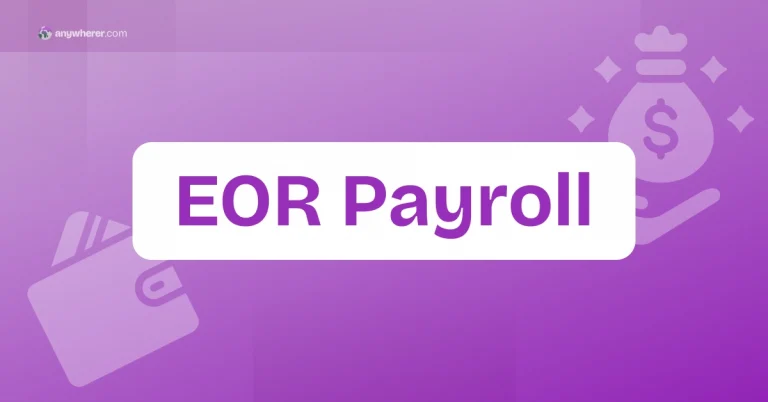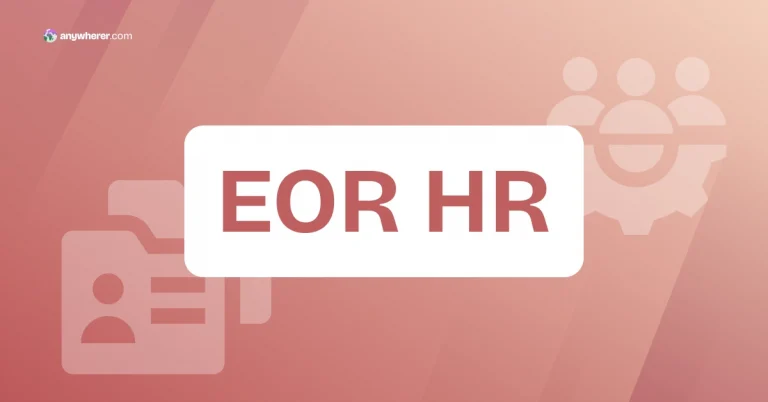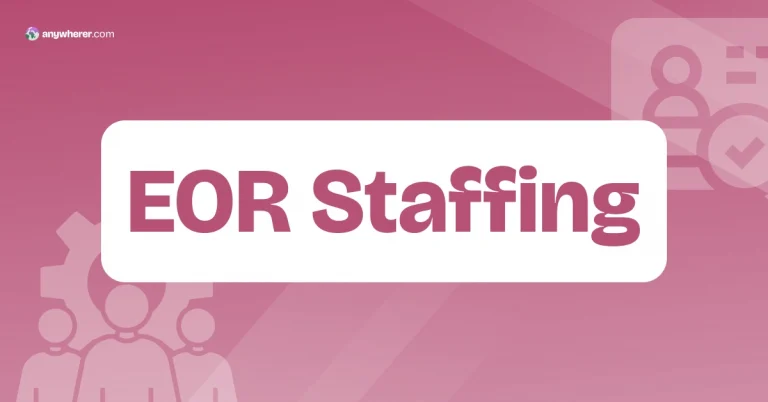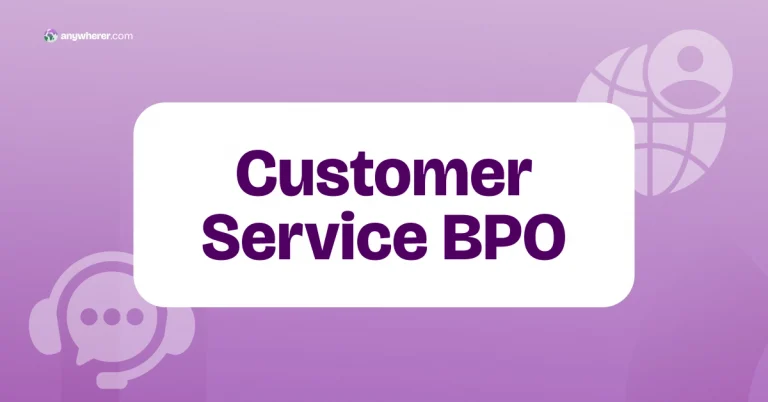A third-party Employer of Record (EOR) is a company that legally employs workers on behalf of another business, handling all local employment responsibilities. Among the foremost reasons for the use of EOR is to take care of compliance with local labour laws and employment law in every country of business for the client. This is especially critical in cross-border hiring, where legal differences are significant and regulations frequently change.
One of the most common and costly mistakes in global hiring is employee misclassification – treating workers as independent contractors when they legally qualify as employees. This can result in heavy fines, back taxes, and legal disputes.
In this article, we’ll explain what EOR compliance means, how it works across borders, and how the EOR model helps companies avoid classification errors and reduce legal risks.
What Is EOR Compliance?
EOR Compliance Definition
EOR compliance is the legislatory and regulatory compliance an Employer of Record undertakes while it hires and employs employees on behalf of a client company, who is hiring. The EOR is then the employer for purposes of administration, laws, and taxes, and the sole responsibility of complying with the labor laws, tax laws, and employment laws of all countries in which the employees are being recruited falls upon the shoulders of the EOR.
Unlike conventional contractor or outsourcing agreements, having an EOR ensures that workers are properly classified, contracts are enforceable in local law, and statutory benefits like social contributions, sick leave, and layoffs are properly managed. This removes the great risk of violating local laws for the client company, especially in going overseas where there is no presence on the ground.
Compliance with EOR is also imperative to avoid penalties, prevent litigations, and maintain the integrity of international workforce operations. EOR services ensure compliance with local labor laws by managing hiring, payroll, and benefits strictly according to jurisdictional requirements.
Why Global EOR Compliance Matters
Growth without a presence is a risk of enormous scale to companies. Labor laws differ immensely between countries, and what is legal in one country is forbidden in another. Compliance through an EOR sidesteps this risk by keeping the entire labor practice – from contract to payroll to termination – under the local law.
Breaking labor legislation has stringent consequences, legal suits, loss of reputation, and even being prohibited from conducting business in certain regions. For example, misclassifying employees can result in back taxes and tax penalties. An Employer of Record avoids this by assuming the employer of record’s role and complete adherence to all the responsibilities of labor.
This is especially important to those companies hiring on an across-jurisdiction basis. Rather than needing to grapple with regulation country by country, firms can rely upon the EOR to manage compliance consistently across all. Compliance through EOR effectively makes international hiring safe, simple, and at scale without compromising compliance legally. A global EOR handles compliance with local employment laws through standardized processes tailored to each jurisdiction’s legal system.
Conventional Risks and Compliance When Recruiting Internationally
Hiring internationally without local presence exposes companies to key compliance risks:
- Worker misclassification: Treating employees as contractors can lead to fines, back taxes, or lawsuits due to strict employment laws.
- Invalid contracts: Using non-localized or noncompliant contracts risks unenforceable terms and legal violations.
- Payroll and tax violations: Errors in tax withholding, social contributions, or benefit payments can trigger audits and penalties.
- Noncompliant terminations: Failing to follow local termination laws, notice periods, or dispute procedures can result in legal claims.
- Benefit non-compliance: Not providing mandatory benefits like healthcare, leave, or pensions breaches local labor codes.
An EOR helps avoid these risks by ensuring compliance across all stages of employment with localized expertise.
How Does an EOR Ensure Compliance with Local Labor Laws
A global Employer of Record is the officially registered employer of the client company and offers complete end-to-end compliance with labor, tax, and employment law in each country. Employer of record local responsibilities include drafting localized contracts, ensuring accurate tax reporting, and providing statutory benefits.
Here’s how:
- Legal entity coverage: EORs operate as they are local entities in all countries where they operate, and therefore they have the legal capacity to recruit and employ employees on behalf of the client.
- Local employment contracts: They establish and offer local employment contracts appropriate for the local nation according to statutory regulations on terms of contract, work hours, leave policy, and notice period.
- Payroll and tax administration: Salary payments in the local currency are arranged by Employer of Record service pricing, income tax, social contributions, and compulsory insurances deducted and remitted. They assume reporting responsibilities to local tax authorities.
- Benefit management: All government-mandated and traditional benefits — e.g., health care insurance, paid holidays, bonuses, and pension schemes — are administered internationally by an EOR according to local labor law.
- Termination and offboarding: Legal offboarding procedures are handled by EORs, and notice, severance, and final pay will be given according to the terms of the law and reduce the risk of industrial action.
So EOR services act as the legal employer in each country, ensuring all operations follow local laws and customs – this is essentially how does an EOR handle compliance with local employment laws.
Benefits of Global EOR Compliance Support
Outsourcing compliance to a worldwide EOR delivers some operational and strategic advantages to companies expanding internationally:
Less legal risk
By having employees work in compliance with the local law, the EOR protects your company from the risk of misclassification penalties, tax evasion, and employee conflict. Such legal protection is vital in nations with complicated or changing labor laws.
Faster market entry
By removing non-compliant direct hire and the requirement to set up a local entity, companies can onboard employees in days, not months — day one fully compliant.
Operational сonsistency
Global EOR provides default reporting, documentation, and payroll forms globally, so that companies can maintain in-house compliance and audit processes.
Cost effectiveness
With penalty savings, attorney fees, and retroactive penalty savings, EOR compliance services are less expensive than solo efforts globally.
Highlight core business
Management of compliance is comprised of ongoing legal updates and local intelligence. EORs allow in-house employees to focus on growth strategy instead of foreign country legal compliance. Companies should assess which EOR service offers the best compliance support by comparing their track records in global labor law adherence.
How Do EOR Services Handle Compliance in Different Countries: FAQs
Where does a global EOR help with compliance?
Best Employer of record firms would typically have employment contracts, withholding payroll taxes, social contributions, employee benefits, end of employment, and labor legislation compliance in every territory.
Will an EOR also help with data protection compliance?
Yes. Sophisticated EORs incorporate local data privacy regulations (e.g., GDPR or PDPA) into HR-related data processing in a way that allows compliant storage and processing.
How often do EORs update their compliance processes?
Top EOR vendors monitor local legislative changes and update policies in real-time to keep pace with emerging labor legislation, tax legislation, and regulation compliances.
Is a compliant EOR enough to remain ahead of the local authorities?
Yes, as long as the EOR is registered and compliant with the law. The EOR remains your employer of record and thus will be responsible for compliance on your behalf.

Yaryna is our lead writer with over 8 years of experience in crafting clear, compelling, and insightful content. Specializing in global employment and EOR solutions, she simplifies complex concepts to help businesses expand their remote teams with confidence. With a strong background working alongside diverse product and software teams, Yaryna brings a tech-savvy perspective to her writing, delivering both in-depth analysis and valuable insights.





